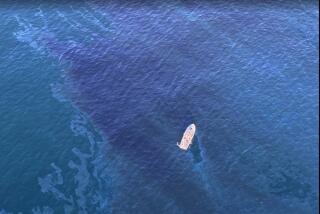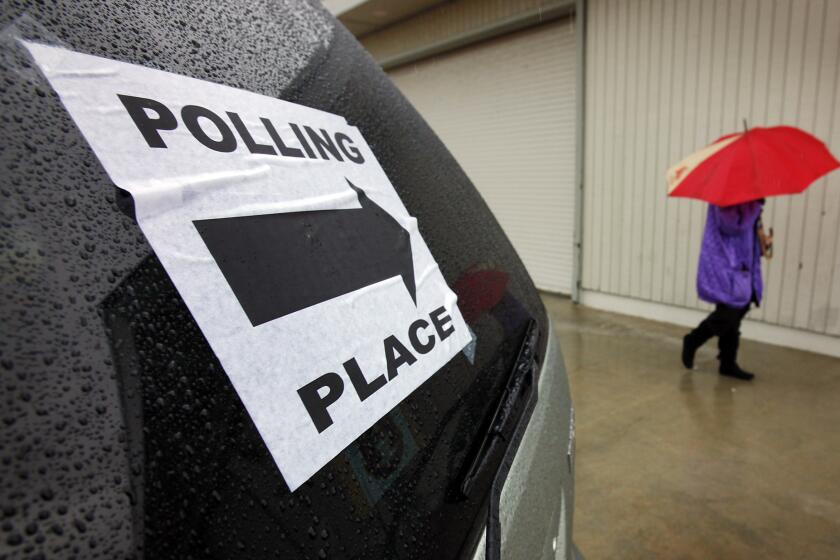BP claims absolute responsibility for oil cleanup
Reporting from Louisiana, Mississippi and — The British oil giant BP LLC, whose deep-water well is gushing hundreds of thousands of gallons of oil daily into the Gulf of Mexico, said Monday that it was “absolutely responsible” for stopping the leak, cleaning up the oil and any resulting environmental damage.
“This is not our accident, but it’s our responsibility,” BP Chief Executive Tony Hayward said in a round of news media appearances. “And where there are legitimate claims for business interruption, we will make them good.”
The oil spill, which occurred at a well 50 miles offshore and a mile beneath the surface, continued to cover a massive area of the gulf, threatening coastal areas of Louisiana, Mississippi, Alabama and Florida, where work crews had fanned out to install barricades.
But a change in wind direction Monday appeared to be keeping the slick offshore, and winds were expected to continue blowing out to sea at least through Tuesday.
Meanwhile, in a sign of eroding political support for offshore drilling, Gov. Arnold Schwarzenegger withdrew his support Monday for a plan to allow new wells to be drilled from an existing platform off the coast of Santa Barbara.
The governor had been a proponent of the Tranquillon Ridge project, which could generate $140 million to help prevent cutbacks in the state parks budget. Despite the governor’s support, the project stalled amid opposition from lawmakers and the state Lands Commission, which has jurisdiction over such oil leases.
“You turn on television and you see this enormous disaster. You say to yourself, ‘Why would we want to take that risk?’ ” Schwarzenegger said Monday. “So the risk is just much greater than the money is worth.”
Supporters of the project said they were disappointed with Schwarzenegger’s announcement, which throws the plan into limbo.
In the gulf, BP took pains Monday to highlight the furious efforts it was making to stop the leak and battle the oil pouring into the ocean at the rate of at least 200,000 gallons a day.
Hayward said the company had deployed “an enormous operation on the surface to contain” the spill. Among those efforts was the use of cargo planes to spray chemical dispersants on the oil slick. Poor weather grounded some planes Monday, however.
Underwater, BP was using robotic submersibles to apply more dispersant, an operation that Hayward said “appear[s] to be having a significant impact.”
Crews worked into the night Monday to install a shutoff valve on a piece of broken pipe about 800 feet from the wellhead. If successful, the fix would stop the flow only from one of three leaks; the wellhead leak remains the most serious, however.
Doug Suttles, BP’s chief operating officer, said construction on a multistory steel containment system designed to drop over the main leak could be completed as early as Tuesday.
The system, which has never been used at this depth, would collect the oil and pipe it to a collection ship on the surface. Suttles said he hoped to have it “up and operating within a week.”
BP also began drilling a relief well late Sunday. That well will bore 18,000 feet below the seabed and eventually intersect with the well causing the blowout. Then, drilling fluid will be injected into the well in hopes of stopping the flow of oil and gas to the surface. That process will probably take up to two months to complete.
Hayward made a distinction between his company’s responsibility and that of Transocean Ltd., which operated the Deepwater Horizon rig that exploded and sank on April 20, triggering the spill. BP leased the rig and had contracted with Transocean to drill the well.
“It was their rig and their equipment that failed, run by their people with their processes,” Hayward said. “But our responsibility is the oil, and the responsibility is ours to clean it up. And that’s what we’re doing.”
Transocean, the world’s biggest deepwater driller and operator of about 140 rigs, responded with a statement, saying it would “await all the facts before drawing conclusions.”
BP, which is self-insured, faces mounting costs for the cleanup.
Fadel Gheit, managing director of oil and gas research for Oppenheimer and Co., said in a note to investors Monday that if BP is able to stop the leak within the next two weeks, “costs could be under $1 billion. If all failed until the relief well is completed in 90 days, costs could be significantly higher.”
The cost of cleanup for the last major U.S. oil spill, the Exxon Valdez disaster in Alaska, was $3.5 billion.
On land, the potential disaster offshore was threatening a multibillion-dollar tourist industry, stretching from the sports fishing camps in Louisiana eastward to Mississippi casinos and beaches in Alabama and Florida. Florida Gov. Charlie Crist expanded a state of emergency to 19 counties, from the Panhandle to the southwest part of the state.
Louisiana estimates the economic impact of fishing tourism alone in the state at $757 million, and it is responsible for nearly 10,000 jobs. Many charter companies had just completed preparations for the busy summer season.
“Every customer we’ve got on a boat now through July has called and wanted to cancel,” said Josh Howard, 28, who owns Deep South Charters Inc. in Venice, La. “It’s really putting a hurt on us.”
A similar story was unfolding on tiny Ship Island, 12 miles from Gulfport, Miss., where Louis Skrmetta caters to weekend visitors to the Gulf Islands National Seashore.
Only a few days ago, Skrmetta had his tourist concession ready for the summer onslaught of visitors — about 1,200 a day on an average weekend day. But on Monday, he and a crew were unplugging nacho cheese machines and storing the umbrellas and beach chairs. The customers had disappeared, and 70 school groups had cancelled trips.
“We are wiped out — this could bankrupt me,” Skrmetta said. Although no oil had washed ashore there, his crew had found a northern gannet, its head covered in oil, that was unable to fly.
In Alabama, Gov. Bob Riley called out the National Guard to shore up beaches and lay booms to defend Dauphin Island against the anticipated arrival of the oil. Guardsmen strung out lines of orange boom and deployed special barriers that harden as they absorb oil.
Staff writers Julie Cart, Scott Kraft, Jill Leovy and Ron White contributed to this report.
More to Read
Sign up for Essential California
The most important California stories and recommendations in your inbox every morning.
You may occasionally receive promotional content from the Los Angeles Times.











